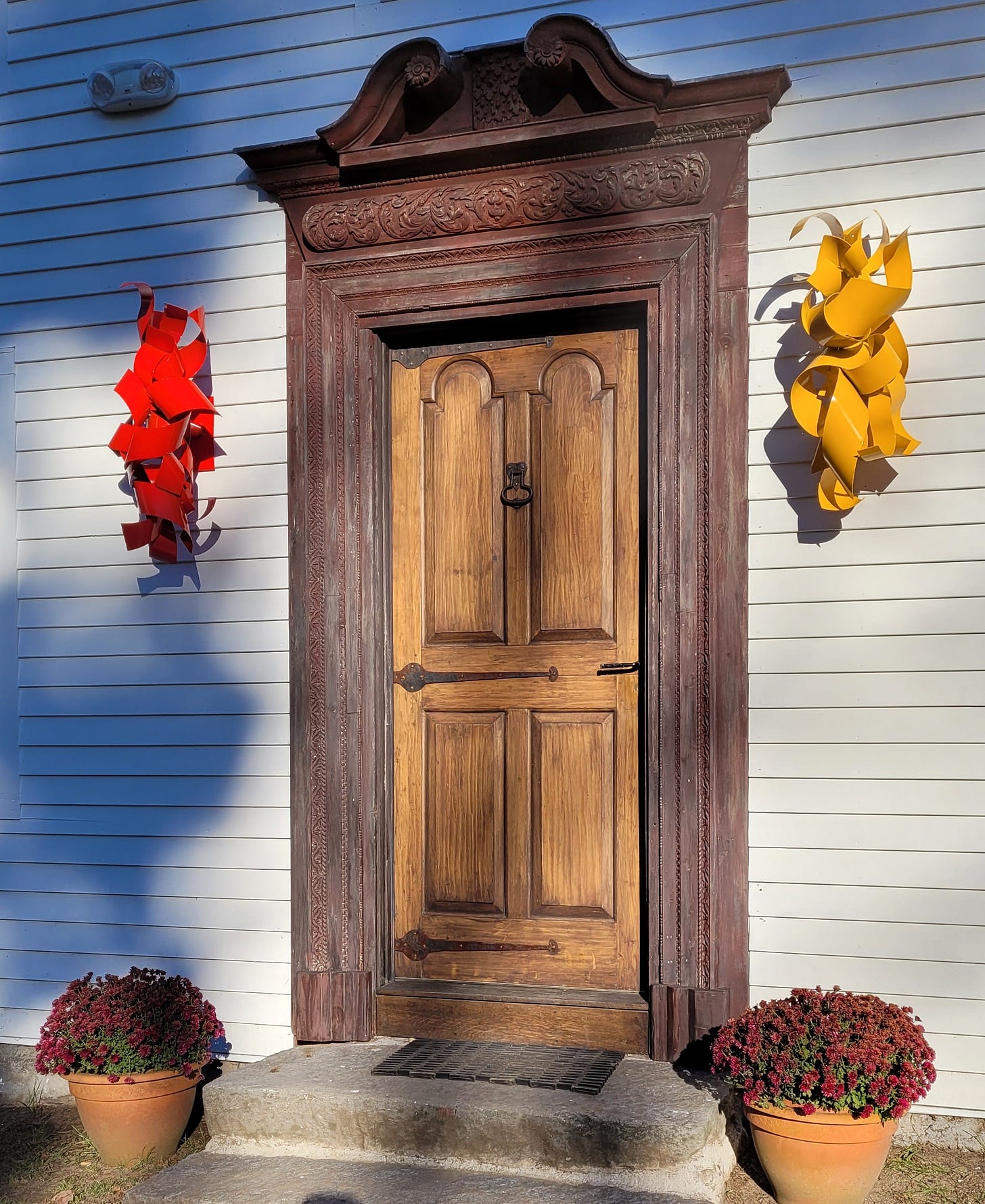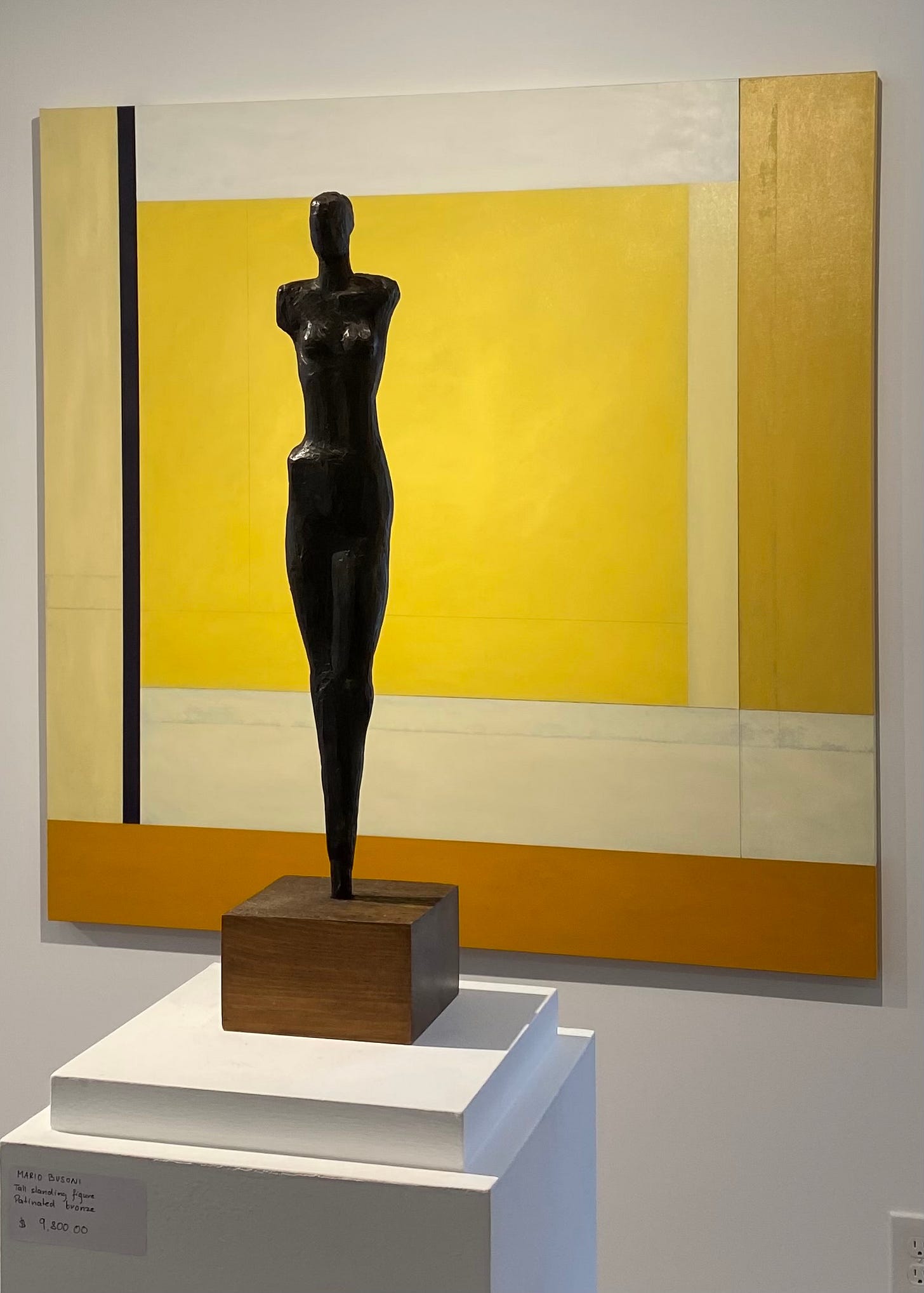Windshield , 2017 Richard Pitts (Photo: R. Pitts)
Litchfield County wears its blueblood heritage and white wooden housing stock as a perpetual evocation of essential New England. However, many of the historic houses sprinkled round the charming small towns of Northwest Connecticut have been lovingly restored and toned up with spiffy modern interiors that honor heritage styled with modern design. I recently stumbled across a persuasive retrofit on the way to an Arethusa ice cream debauch in Bantam.
Deco-Eclipse, Steven Lowy (Photo: Artur Matuszewski)
An unpainted, clapboard colonial house had long stood neglected along Route 202, no doubt inspiring preservationist dreams to many who regularly drove by. It was born in 1755 as a cape, grew up to a colonial and has housed everything from a parsonage to a tavern to a doctor’s office. And behold the gallery owner Artur Matuszewski has magically transformed the space, exposing the beautiful bones of the classic unornamented house which just opened in October, 2021. The amArtHouse delicately built a white box inside the traditional rectangular structure, installing new six over six windows in place, graciously breaking up the walls in keeping with the customary Yankee aesthetic of small, strictly-spaced windows.
amArtHouse Sculptures, Richard Pitts (Photo: Kathleen Hulser)
The current exhibition on view till January of 2022 centers on Richard Pitts and with its four other artists, showcases the gallery owner’s excellent taste — and his spatial chops. This traditional house now harmoniously frames contemporary work. Large scale sculpture dots the lawn. Steven Lowy’s illuminated mezzaluna work powered by a solar battery turns the site into a mysterious alien planet at night. The gallery has installed two curling Pitts aluminum pieces, echoing the position of traditional side lamps, to flank the door. A marvelously ornate 1890s surround turns this into a grand entry, an eclectic note in the crisp clapboard expanse. Indeed, as Pitts says, “the sculpture creates the landscape as much as the landscape creates the sculpture. “ At the corner of the house, the sculpture “Daybreak” yearns to climb like a vine.
Daybreak, 2021 Richard Pitts (Photo: Artur Matuszewski)
The artist Richard Pitts is equally adept with brush, print and torch; in the current exhibition both his large scale paintings and array of sculptures reference the building blocks of physical space and the play of edges.
Juggling the Universe, 2020 Richard Pitts (Photo: C.C. Arshagra)
“Juggling the Universe” loves the contrast of curve and rectangle: cylinders, blocks and arches spin in space. A deus ex machina pulls strings, but the strewn elements seem to have their own momentum. Like many of his horizontal canvases at amArtHouse, this work has multiple points of view. No gravity anchors the fragments, rather a maelstrom or vortex effect holds forces in tension. The swirling objects seem to fling otherworldly specks in the wake of a passage from nowhere to outer space. The jumble of space debris is insouciant, as if thumbing its nose at ordinary principles of movement.
These effects escalate when Pitts moves to color. “Kaleidoscope” felicitously installed at the head of the central staircase applies orange elements to the black/gray palette of his earlier work. The orange alert appears almost as a tiger gliding amidst three-dimensional fragments, sometimes behind and sometimes in front of planes. Pitts jokingly told me he might retitle the piece “Tiger Burning Bright,” after hearing this interpretation. The viewer loses certainty about what is an edge and what is a form, unwittingly navigating layers that suggest the whimsical play of dimension in our perceptions of the world. “Art is always trying to expand your reality and consciousness and recreate the world again,” comments Pitts.
Kaleidoscope, 2012 Richard Pitts (Photo: C.C. Arshagra)
This concept plays out spectacularly in a mixed media collage, “Orange Crush.” Here, applied snippets of colored tape and flying fragments are punctuated with black and white striped and polka-dotted motifs that look like a pop art couch chopped in a blender. Both 2D and 3D effects make things appear in hidden layers, as though pulling the bars of reality apart. Color contributes to the action with pulsing slashes of yellow and blue which make the viewer feel like she is traveling through layers to an unknown core, even as centrifugal forces whip pieces to the edge — of the canvas or maybe of the universe. Pitts clearly enjoys sending our eyeballs ricocheting around space, where his dimensional pinball game unfolds at top speed.
Orange Crush, 2012 Richard Pitts (Photo: C.C. Arshagra)
His sculptural work in metal binds these forces together more tightly. “Black,” 2013 has voluptuous curves and lethal edges, cold and yet so hot that metal drips cling to some contours. In both red and black sculptures cut elements peel back, as though metal could mimic the luscious bends of cloth. Jaunty fronds, fringed waves, and serrated borders proliferate amongst the coils and right angles of the sculpture’s skeleton. The coil is a core structure that suggests a mix and match DNA sequence, abstracted, simplified and quoted. These forms in steel and aluminum are “unnatural”, and yet have the integrity of a thing grown, rather than assembled. This dynamic is particularly prominent when seeing large sculptures in situ, with greenery and tree trunks sighted through apertures in the metalwork.
Metamorphosis, 2000-2006 Richard Pitts (Photo: Kathleen Hulser)
The tour de force, “Metamorphosis,” lines up a jet trail of morphing forms, installed around the corner of the gallery. Made of painted canvas laminated on light Luan wood, the black and white pieces ascend in a stream of squared-off rectangles, melting into a tangled knot, and then breaking free. As in Pitts’ paintings that features duct work and tubing on the loose, this piece pulses with energy. How can such exuberant geometry wriggle its way out of here?
Some wonderful functional art by Robert Messyasz appears around the two floors of display space. My favorite was a lighted Trojan Horse head lamp, simultaneously elegant and fierce. By juxtaposing functional art openly intended for home décor with fine arts, the gallery reminds us that all art is one and belongs where the heart most desires it to be.
Horse Head Lamp, Robert Messyasz (Photo: Kathleen Hulser)
See also the stunning duo of Monolith lamps, composed of Egyptian-style columns topped with pierced tin shades. Messyasz boldly mixes historical elements such as this variation on a pierced tin lantern, with modern materials and aesthetics.
Standing Figure, 2001, Mario Busoni Interior 41, Chris Kelly (Photo: Artur Matuszewski)
As if these riches were not feast enough, the entire first floor of the gallery features an installation of finely tuned abstractions from Chris Kelly’s golden ratio deconstructions series, artfully interspersed with figurative sculpture by Mario Busoni. Once again, the arrangements maximize the qualities of the colonial house, as visitors also glimpse outdoor work and green yards through the many-paned windows. Altogether, the new gallery offers an exhilarating plunge into contemporary art.












